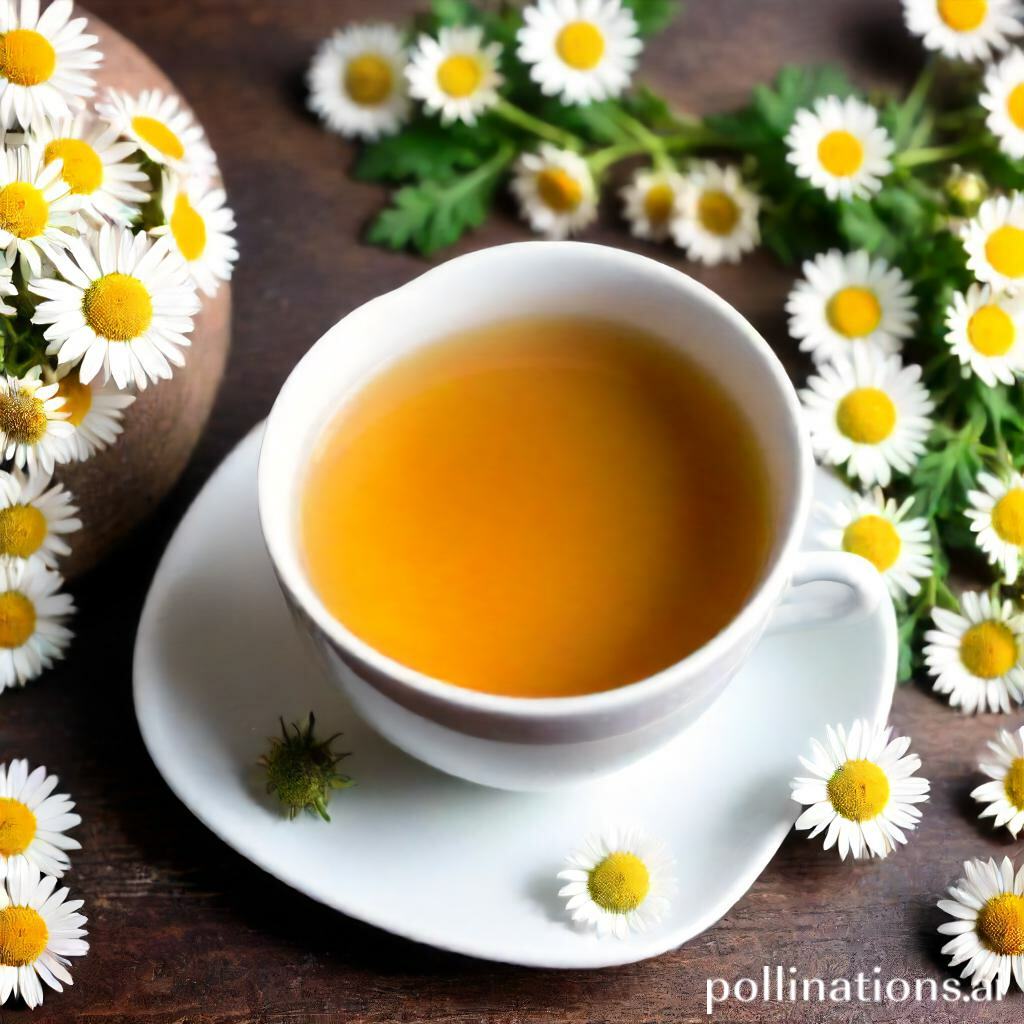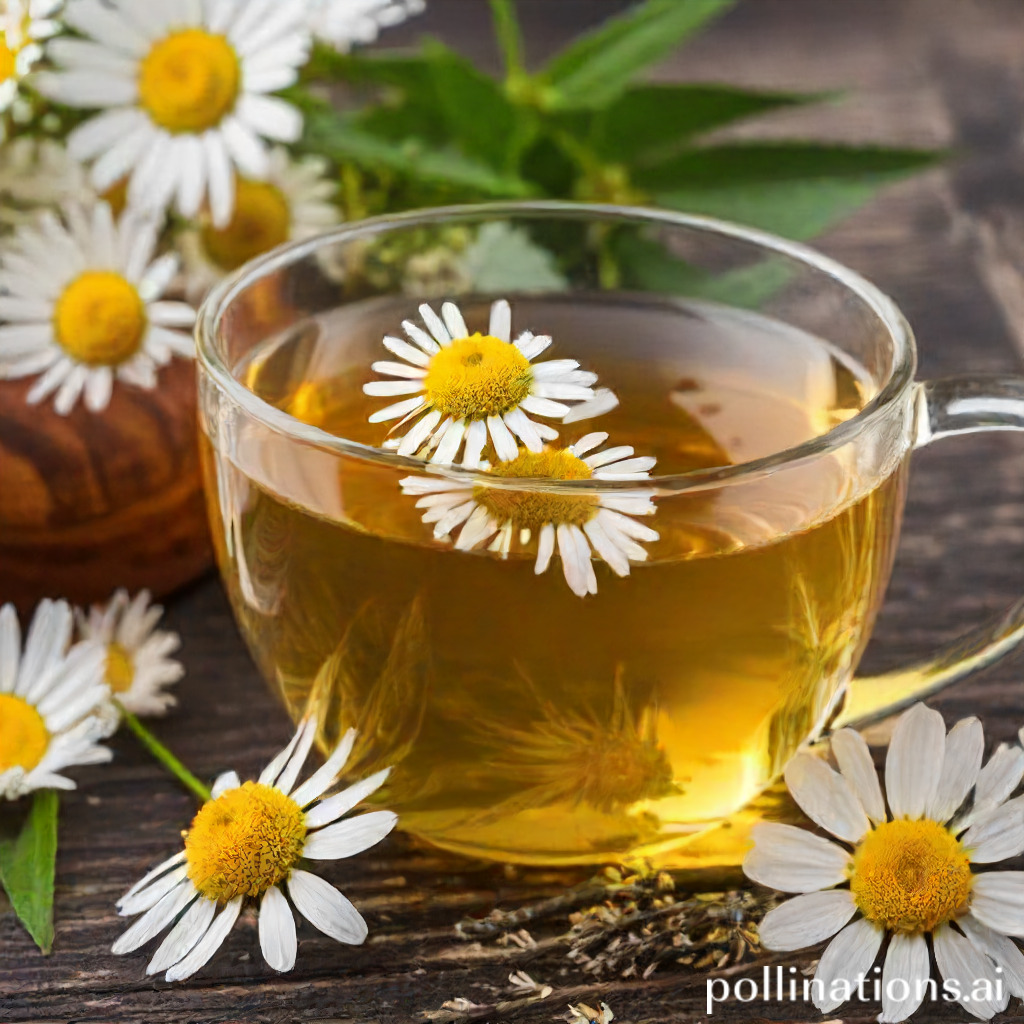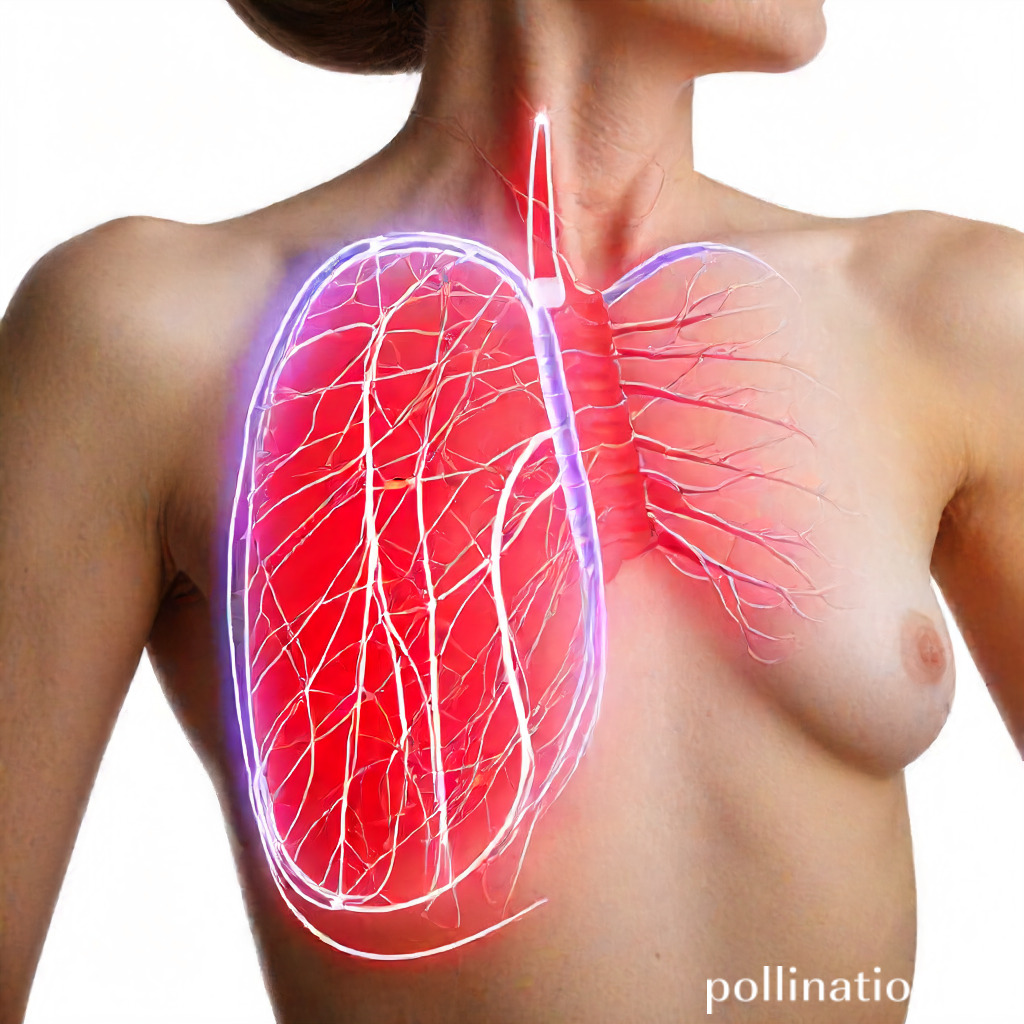Chamomile tea is a popular herbal remedy that has been used for centuries to support overall health and well-being. One of its potential benefits is its ability to help reduce swollen lymph nodes.
Lymph nodes are small, bean-shaped glands that play a vital role in the body’s immune system. When they become swollen, it can be a sign of infection or inflammation.
Chamomile tea contains anti-inflammatory properties that may help to reduce the swelling of lymph nodes, promoting a healthier immune system. So, adding a cup of chamomile tea to your daily routine may provide some relief and support for swollen lymph nodes.
THE HEALING PROPERTIES OF CHAMOMILE
1. Anti-inflammatory Effects of Chamomile
Chamomile, a medicinal herb with a long history of use, has been found to possess remarkable anti-inflammatory properties. Studies have shown that chamomile extracts can inhibit the production of inflammatory markers in the body, such as cytokines and prostaglandins. By reducing inflammation, chamomile can help alleviate symptoms of various inflammatory conditions, including arthritis, digestive disorders, and skin irritations.
For instance, research has demonstrated that chamomile tea, when consumed regularly, can significantly reduce the severity of symptoms in individuals suffering from rheumatoid arthritis. The anti-inflammatory compounds in chamomile, such as chamazulene and bisabolol, help to soothe inflamed joints and alleviate pain.
2. Chamomile’s Role in Immune System Modulation
Chamomile has been found to play a crucial role in modulating the immune system. It possesses immunomodulatory properties that can both augment and regulate immune responses. This means that chamomile can help strengthen the immune system when it is weakened, such as during periods of stress or illness, and also suppress an overactive immune system in conditions like allergies or autoimmune diseases.
Research has shown that chamomile extracts can stimulate the production of immune cells, such as lymphocytes and macrophages, which are essential for combating infections and preventing the development of chronic diseases. Furthermore, chamomile can help regulate the release of inflammatory mediators by immune cells, thus preventing excessive immune responses that can lead to tissue damage.
3. Antioxidants in Chamomile and Their Benefits
Chamomile contains a rich array of antioxidants that provide numerous health benefits. These antioxidants, such as flavonoids and terpenoids, help protect the body against oxidative stress and damage caused by harmful free radicals.
Studies have indicated that the antioxidants in chamomile can help reduce the risk of chronic diseases, including cardiovascular diseases and certain types of cancer. For example, the flavonoids apigenin and luteolin found in chamomile have been shown to inhibit the growth of cancer cells and prevent the formation of tumors.
Additionally, chamomile antioxidants contribute to skin health by promoting collagen synthesis and reducing oxidative damage. As a result, chamomile-based skincare products are often used to alleviate skin conditions such as eczema, acne, and signs of aging.
| Anti-inflammatory Effects | Chamomile extracts inhibit the production of inflammatory markers, reducing inflammation and relieving symptoms of conditions like arthritis and skin irritations. |
| Immune System Modulation | Chamomile enhances and regulates immune responses, strengthening the immune system during weakness and suppressing overactive immune responses in allergies and autoimmune diseases. |
| Antioxidants and Benefits | The antioxidants in chamomile protect against oxidative stress, reducing the risk of chronic diseases and promoting skin health. |

HOW CHAMOMILE TEA MAY SOOTHE SWOLLEN LYMPH NODES
Chamomile tea, known for its soothing properties, has been found to have potential benefits in reducing swollen lymph nodes. This section explores the mechanisms of action behind chamomile tea’s efficacy and provides evidence supporting its use for lymphatic health. Additionally, it offers practical tips on how to integrate chamomile tea into your daily routine.
Potential Mechanisms of Action
Chamomile tea contains compounds that possess anti-inflammatory and antioxidant properties. These properties may help reduce inflammation and support the lymphatic system’s natural healing processes. The chamomile flower’s active ingredients, such as flavonoids and terpenoids, are believed to contribute to these therapeutic effects.
Evidence Supporting Chamomile’s Efficacy
Several studies have indicated chamomile’s potential in reducing lymph node swelling. A research study published in the Journal of Ethnopharmacology found that chamomile extract exhibited anti-inflammatory effects in animal models, suggesting its potential for reducing lymph node inflammation. Additionally, a clinical trial published in the European Journal of Medical Research reported that chamomile tea consumption resulted in a decrease in lymph node size in patients with lymphadenopathy.
Integrating Chamomile Tea into Your Routine for Lymphatic Health
If you are looking to incorporate chamomile tea into your routine to support lymphatic health, consider the following tips:
- Choose high-quality chamomile tea made from organic flowers to ensure maximum benefits.
- Infuse 1-2 teaspoons of dried chamomile flowers in hot water for 5-10 minutes to prepare a soothing cup of tea.
- Drink chamomile tea 1-2 times a day to experience its potential healing effects on swollen lymph nodes.
Remember to consult with a healthcare professional before making any significant changes to your routine, especially if you have underlying health conditions or are taking medications.
PREPARING CHAMOMILE TEA FOR MAXIMUM BENEFITS
Chamomile tea is not only a delicious and soothing beverage, but it also offers numerous health benefits. To fully maximize the benefits of chamomile tea, integral to follow the right preparation techniques and choose high-quality chamomile. In this section, we will ponder the steps to prepare chamomile tea for optimal potency.
1. Selecting High-Quality Chamomile
The first step in preparing chamomile tea is to select high-quality chamomile flowers. Look for chamomile that is fresh, aromatic, and free from any contaminants. Organic chamomile is often a good choice as it is free from pesticides and other chemicals. The quality of the chamomile will greatly impact the taste and effectiveness of the tea.
2. Brewing Techniques for Optimal Potency
In terms of brewing chamomile tea, there are a few key techniques to ensure maximum potency. Start by bringing water to a boil and then allowing it to cool slightly. This will prevent the water from being too hot and potentially damaging the delicate chamomile flowers. Next, add the chamomile flowers to a teapot or infuser and pour the hot water over them. Let the tea steep for about 5 minutes to allow the flavors and beneficial compounds to fully infuse into the water. Finally, strain the tea and it’s ready to be enjoyed.
3. Best Times to Drink Chamomile Tea for Lymph Health
Chamomile tea can be consumed at any time of the day, but there are certain times when it can be particularly beneficial for lymph health. Drinking chamomile tea in the evening can help promote relaxation and improve sleep quality. This can be especially helpful for individuals with lymphatic issues as it supports the body’s natural detoxification process during sleep. Additionally, drinking chamomile tea after meals can aid in digestion and reduce inflammation in the lymphatic system.

Complementary Lifestyle Tips for Managing Lymph Node Swelling
1. Dietary Considerations for Lymphatic Support
The foods we consume play a crucial role in supporting the health of our lymphatic system. Assimilating certain foods into our diet can help reduce lymph node swelling and promote overall lymphatic drainage. Some key dietary considerations include:
- Hydrating Fruits: Fruits such as watermelon, citrus fruits, and berries are not only delicious but also high in water content, helping to keep the lymphatic system hydrated.
- Leafy Greens: Adding leafy greens like spinach, kale, and broccoli to your meals can provide essential nutrients and antioxidants that support lymphatic health.
- Protein-Rich Foods: Including lean meats, fish, beans, and legumes in your diet can aid in repairing and building lymphatic tissues.
- Healthy Fats: Including sources of healthy fats like avocados, olive oil, and nuts into your meals can help reduce inflammation and support lymphatic function.
2. Importance of Hydration
Proper hydration is vital for maintaining optimal lymphatic function. Drinking an adequate amount of water throughout the day helps flush out toxins and waste products from the lymphatic system, reducing lymph node swelling. Aim to consume at least 8 glasses of water daily and avoid sugary drinks that can impede lymphatic flow.
3. Exercise and Its Role in Lymphatic Drainage
Regular physical activity is essential for promoting lymphatic drainage and reducing lymph node swelling. Engaging in exercises that involve rhythmic movements, such as walking, swimming, or yoga, can stimulate the lymphatic system’s flow and help remove excess fluid and waste. Aim for at least 30 minutes of moderate-intensity exercise most days of the week.
4. Stress Management Techniques
Chronic stress can negatively impact the lymphatic system and contribute to lymph node swelling. Implementing stress management techniques can help alleviate stress and support lymphatic health. Some effective techniques include:
- Meditation: Practicing meditation or deep breathing exercises can help reduce stress levels and promote lymphatic flow.
- Yoga: Engaging in yoga poses that involve gentle stretching and twisting can stimulate lymphatic circulation and aid in reducing lymph node swelling.
- Massage: Regular lymphatic massage can help stimulate lymphatic drainage and reduce swelling in the lymph nodes.
- Relaxation Techniques: Assimilating activities such as listening to calming music, taking warm baths, or engaging in hobbies can help relax the body and mind, supporting overall lymphatic health.
| Tip | Description |
|---|---|
| Tip 1 | Include hydrating fruits like watermelon, citrus fruits, and berries in your diet. |
| Tip 2 | Add leafy greens such as spinach, kale, and broccoli to your meals. |
| Tip 3 | Incorporate protein-rich foods like lean meats, fish, beans, and legumes into your diet. |
| Tip 4 | Include healthy fats from sources like avocados, olive oil, and nuts. |

CAUTIONS AND CONSIDERATIONS WHEN USING CHAMOMILE TEA
Chamomile tea is a popular herbal remedy known for its calming properties and various health benefits. Albeit, pivotal to be aware of certain cautions and considerations when using chamomile tea to ensure its safe and effective use.
1. Potential Side Effects and Interactions
At the same time chamomile tea is generally considered safe for most people, it may cause allergic reactions in individuals who are sensitive to plants in the daisy family. It is advisable to test a small amount of chamomile tea before consuming it regularly. Additionally, chamomile tea may interact with certain medications, such as blood thinners or sedatives. Essential to consult with a healthcare professional if you are taking any medications to avoid potential interactions.
2. When to Seek Professional Medical Advice
If you experience any adverse reactions or unusual symptoms after consuming chamomile tea, it is recommended to seek medical advice. This is particularly important if you have a known allergy to plants in the daisy family or if you are pregnant or breastfeeding. A healthcare professional can provide personalized guidance and determine the appropriate course of action.
3. Perceiving the Limits of Herbal Remedies
During chamomile tea has been used for centuries as a natural remedy, it is essential to understand that herbal remedies have their limitations. Chamomile tea should not be used as a substitute for professional medical advice or treatment. If you have a serious medical condition or require specific medical interventions, it is crucial to consult with a qualified healthcare provider.
| Side Effects: | Potential allergic reactions in individuals sensitive to daisy family plants |
|---|---|
| Interactions: | May interact with certain medications, such as blood thinners or sedatives |
| When to Seek Medical Advice: | If experiencing adverse reactions or unusual symptoms, known allergy to daisy family plants, pregnancy or breastfeeding |
| Limits of Herbal Remedies: | Herbal remedies should not be used as a substitute for professional medical advice or treatment |
FAQ about Chamomile Tea and Lymph Node Health
FAQ 1: How often should I drink chamomile tea for swollen lymph nodes?
It is recommended to drink chamomile tea for swollen lymph nodes 2-3 times a day.
FAQ 2: Can chamomile tea replace conventional medicine for lymph node issues?
Chamomile tea is not a substitute for conventional medicine for lymph node issues. It can be used as a complementary treatment.
FAQ 3: Are there any specific types of chamomile tea that are more effective?
German chamomile (Matricaria chamomilla) is considered to be more effective for lymph node issues.
FAQ 4: How long does it take to see results from drinking chamomile tea?
The time to see results from drinking chamomile tea for swollen lymph nodes may vary, but typically it takes a few weeks to notice improvements.
FAQ 5: Can children drink chamomile tea for swollen lymph nodes?
It is advisable to consult a pediatrician before giving chamomile tea to children for swollen lymph nodes.
Bottom Line
Chamomile tea is a natural remedy that may help reduce swelling in lymph nodes. It has anti-inflammatory properties that can soothe the lymphatic system and promote healing. In contrast, vital to consult with a healthcare professional for proper diagnosis and treatment of swollen lymph nodes. Along with drinking chamomile tea, maintaining a healthy lifestyle, including regular exercise and a balanced diet, can also support lymphatic system health.
In conclusion, at the same time chamomile tea may offer some relief for swollen lymph nodes, it is not a substitute for medical advice. It can be used as a complementary treatment to support overall well-being and lymphatic system function. Remember to listen to your body and seek professional guidance for any persistent or concerning symptoms.

